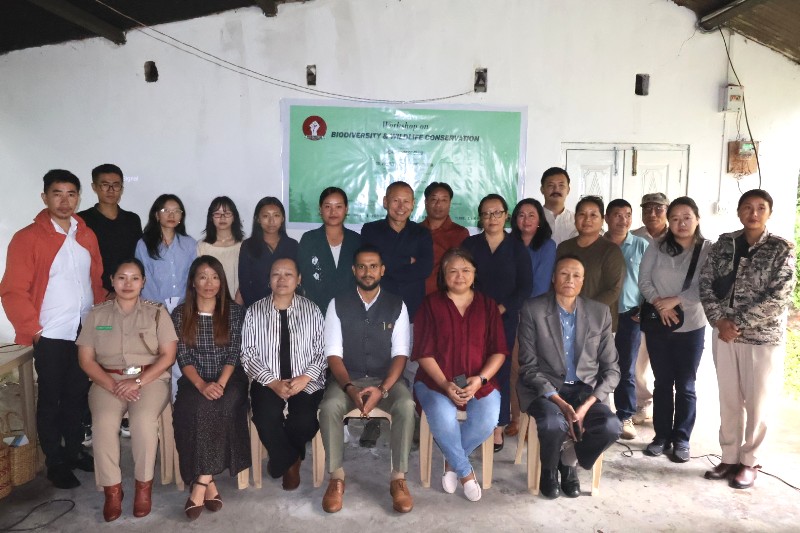THURSDAY, JULY 31, 2025
- Home
- Kohima Press Club marks silver jubilee with conservation workshop
Kohima Press Club marks silver jubilee with conservation workshop
The Kohima Press Club organised a workshop on ‘Biodiversity and wildlife conservation’ at Botanical Garden, Kohima, on Saturday.
Published on Jun 21, 2025
Share

KOHIMA — A workshop on ‘Biodiversity and wildlife conservation’ organised by the Kohima Press Club (KPC), in collaboration with Silviculture Division Kohima, as part of the yearlong celebration of KPC's 25th anniversary was held at Botanical Garden, Kohima, on Saturday.
KPC president Alice Yhoshü said the workshop was envisioned to equip members with greater knowledge of biodiversity and conservation issues, while also helping media professionals report more effectively on related topics.
Dr. Prabhat Kumar, State Silviculturist, emphasised the need for conservation efforts, including awareness-building, plantations, and supporting forest-dependent communities.
He noted that hunting, once driven by food needs, has now become a recreational or commercial activity, emerging as a serious concern. He stressed that conservation is necessary simply because it is the right thing to do.
To this, he called for collective efforts that can lead to significant impact.
Kumar added that such efforts also contribute to shifting public mindsets, especially in addressing demand-driven issues like the consumption of wild meat.
Bano Haralu, Project Lead Wildlife Conservation Society - India, said that from 2002 to 2024, Nagaland lost 35.4 kha (354 sq kms) of humid primary forest, making up 14% of its total tree cover loss in the same time period.
Nagaland's humid primary forest area declined by 8.6% over the period, she said.
Haralu also informed that from 2001 to 2024, Nagaland lost 268 kha (2680 sq kms) of tree cover, equivalent to a 20% of the 2000 tree cover area. This loss was equivalent to 161 million metric tons of CO₂ equivalent emissions. However, she clarified that these figures did not account for any gains in tree cover during the same period.
Some of the challenges, she noted, were fragmentation of forests due to absence of Community Conserved Area connectivity in most places, unregulated hunting, absence of conservation awareness, and lack of alternate livelihood options.
She also highlighted threats like soil erosion, monocropping practices, such as oil palm, as detrimental to biodiversity, in addition to increasing labour dependency from outside the state.
The promising sustainable livelihood for forest-fringe communities, she noted, was Nagaland's honey production and emphasised the need to explore income alternatives beyond traditional agriculture.
Haralu also voiced concern over Nagaland’s failure to access national and international conservation funds effectively.
Calling for the creation of grassroots collectives of farmers and youth, she said that Nagaland’s strength lies in its communities.
Gwasinlo Thong, member of Indigenous People and Local Communities, Advisory Board, WCS-International, and chairman of Sendenyu Community Biodiversity and Wildlife Conservation Board, spoke on protection measures and implementation of conservation with a focus on Sendenyu Community Biodiversity and Wildlife Reserve.
For conservation efforts, he announced several measures, including a complete ban on hunting in Sendenyu, chemical fishing, bird trapping with gums, airgun use, chemical weedicides, and jungle burning. Additionally, 20 sq km of village community land will be demarcated as a ‘biological diversity reserve’ to preserve natural flora and fauna in their natural habitat.
As for the enforcement, he noted that all conservation rules adopted by the village community become law within the Sendenyu jurisdiction and the village youth organisation, alongwith the conservation committee, enforces the rules. Cases involving violation of rules are settled at the Sendenyu village traditional court, he said.
To implement these strategies, villagers are encouraged to shift from jhuming cultivation to eco-friendly wet terrace cultivation, with 90% having successfully adopted the practice, he added.
The Silviculture Division, Kohima, also donated 100 tree saplings to members of the Kohima Press Club.
Also read: Kohima Press Club pushes for permanent building

